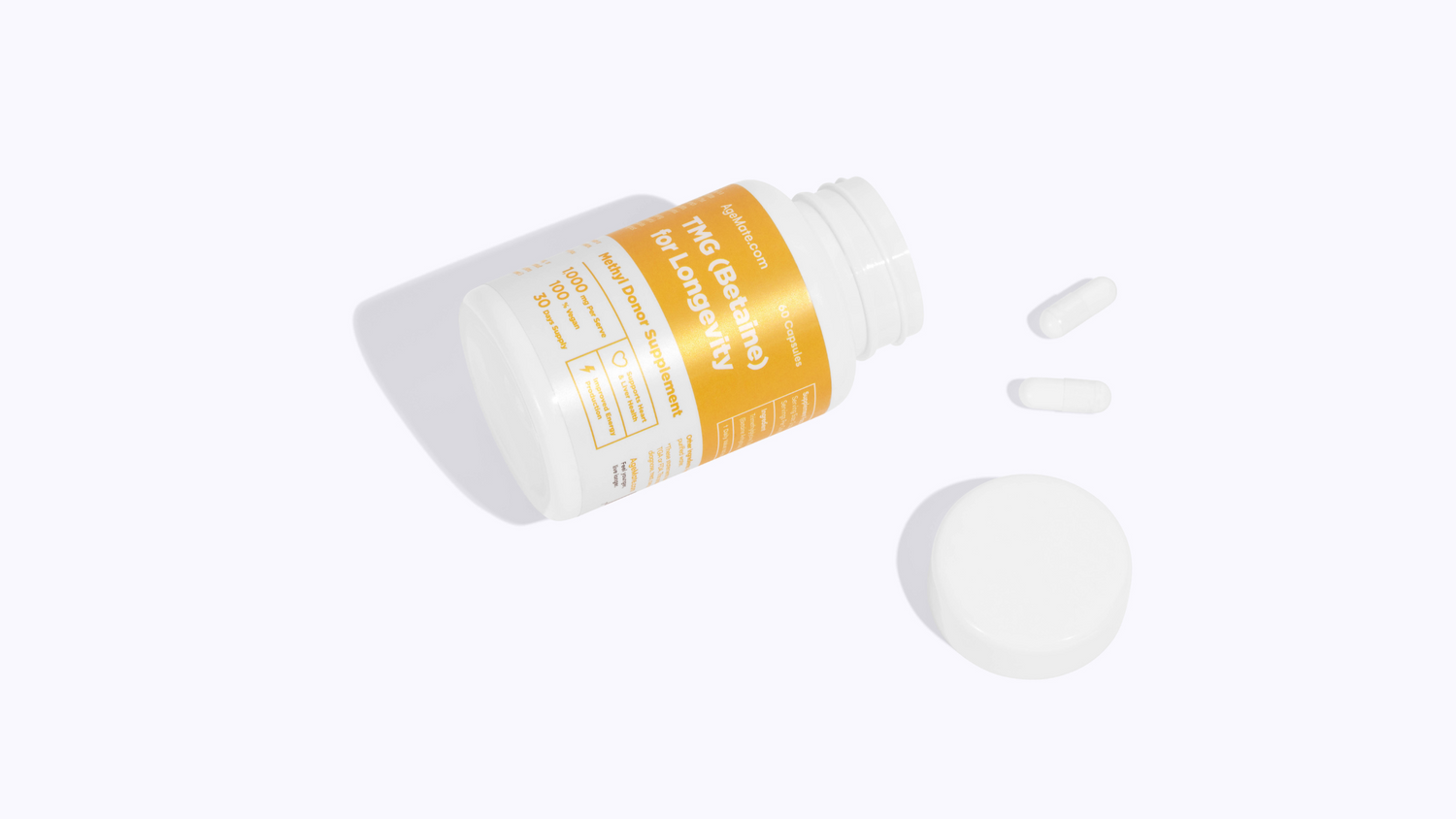Trimethylglycine (TMG), also known as betaine, is a compound that the body produces naturally and can also be found in foods and supplements. It plays a critical role in methylation processes within the body, which are vital for functions like DNA production, cellular energy levels, and liver health.
What Are the Benefits of TMG?
TMG has several noted health benefits, including improving athletic performance, supporting liver health, promoting healthy insulin levels, and potentially aiding in the treatment of depression and anxiety. It works partly by lowering homocysteine levels in the blood, which are linked to various health conditions, including heart disease.
TMG is also associated with cognitive enhancement, better skin health, and improved physical performance and muscle strength (R).
TMG and Longevity
The connection between TMG and longevity is increasingly becoming a topic of interest in the field of anti-aging research. TMG contributes to longevity through several mechanisms:
🟣 Methylation Support
Methylation is a vital biological process involved in DNA repair, gene expression, and the detoxification of homocysteine.
TMG donates methyl groups to support these methylation processes, which are crucial for maintaining cellular health and function (R). Proper methylation is associated with reduced rates of age-related genetic degradation (R).
🟣 Liver Health
TMG has been studied for its role in improving liver function and reducing the risk of fatty liver disease, a condition that can significantly impact lifespan. By promoting liver health, TMG may contribute to better overall health and longevity (R).
🟣 Cognitive Health
A study with 193 older adults found that TMG levels went up after taking cobalamin supplements, which helped improve their memory, thinking speed, and overall brain function (R).
Those with the biggest increase in TMG saw the greatest memory improvements. TMG is also being studied as a treatment for brain diseases like Alzheimer's, but more research is needed (R).
🟣 Physical Performance and Recovery
TMG supplementation has been linked to improved physical performance, muscle endurance, and recovery. By enhancing physical health, TMG may contribute to a more active lifestyle, which is a well-known factor in promoting longevity.
One study found that fourteen weeks of betaine supplementation improved strength, endurance, and sprint performance in young professional soccer players, making it a beneficial strategy for maintaining performance throughout a competitive season (R).
🟣 Supporting NAD+ Precursor Supplementation
TMG supports the use of NAD+ precursors like NMN, which are crucial for cellular energy and may have anti-aging effects.
By ensuring optimal levels of methyl groups, TMG supplementation alongside NAD+ precursors might amplify their beneficial impacts on aging and longevity (R).
While the direct impact of TMG on lifespan extension is still under investigation, its roles in supporting methylation, reducing homocysteine levels, enhancing liver health, and promoting overall physical wellness are thought to contribute to its potential longevity benefits.
The TMG and NMN Connection
TMG and NMN (Nicotinamide Mononucleotide) work synergistically, primarily because NMN consumes methyl groups during its conversion process in the body. Since methylation is crucial for numerous bodily functions, TMG supplementation can counteract the depletion of methyl groups.
Thus, when TMG is used alongside NMN, it can help replenish these essential methyl groups, potentially making NMN more effective and supporting the body's overall methylation demands.
How Long Does It Take for TMG to Work?
The onset of benefits from TMG can vary based on individual health conditions and the intended health outcomes.
While some effects, like improved athletic performance or mental well-being, might be noticeable within a shorter timeframe (weeks to months), others, particularly those related to long-term health improvements like liver health or methylation processes, may take longer to manifest.
Recommended Dosage and Sources
The typical dosage for TMG supplementation can range widely, from about 500 mg to 6 grams per day, depending on the individual's needs and the specific health goals targeted. Higher doses are generally used for specific conditions under medical guidance, but most people might find lower doses adequate.
TMG can be obtained from food sources, like wheat bran, spinach, and beets, and as a supplement. However, dosages should be tailored to individual needs and, if possible, discussed with a healthcare professional.
Conclusion
In summary, TMG offers a variety of health benefits and can complement the use of NMN supplements by supporting methylation in the body. If considering TMG supplementation, it's crucial to consider your dietary intake, health status, and whether you're using NMN or other supplements that affect methylation.





